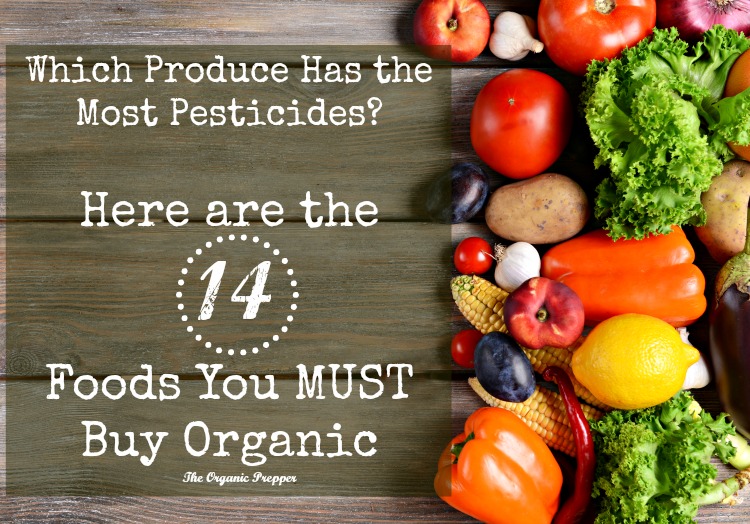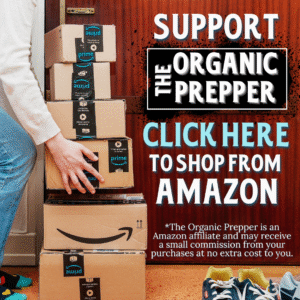If you're new here, you may want to subscribe to my RSS feed. Thanks for visiting!
Having a nutrient rich dinner tonight? Want a salad? Choosing healthful ingredients like kale, spinach, tomatoes, and cucumbers?
Here’s the sad truth: unless that salad is organic, those healthful-sounding ingredients could contain more pesticide residue than nearly anything else on the produce aisle. Sure, Big Agri will tell you that the pesticides they use are different and that they won’t harm you, but scientific evidence does not back up their claims.
The good news is, you can avoid all that and you can also speak out by voting with your wallet. The Environmental Working Group has announced their annual Dirty Dozen list for 2016, featuring the foods with the most pesticides. This year, there are two “bonus” foods to avoid when conventionally grown.
Here’s why you need to avoid food raised with the use of pesticides.
I looked at the sentence I just typed and thought, wow, it should be evident why we should avoid those foods. Why would we want to eat something that has been doused in a chemical that kills another organism? In what world does that possibly make sense?
But the thing is, it has become normalized. Everyone knows the plants are sprayed. Big Agri has made it seem like food simply cannot go from seed to table without a heavy, frequent dousing. Anyone who has ever raised even a tomato plant in a pot on the patio knows that is not the case, though.
Pesticides are a big deal. Huge. The ingestion of pesticides can cause health problems such as “birth defects, nerve damage, cancer, and other effects that might occur over a long period of time.” Especially at risk of harm from pesticides are children. The EPA, you know, the same group that approves pesticides for use, ironically warns:
Infants and children may be especially sensitive to health risks posed by pesticides for several reasons:
- their internal organs are still developing and maturing,
- in relation to their body weight, infants and children eat and drink more than adults, possibly increasing their exposure to pesticides in food and water.
- certain behaviors–such as playing on floors or lawns or putting objects in their mouths–increase a child’s exposure to pesticides used in homes and yards.
Pesticides may harm a developing child by blocking the absorption of important food nutrients necessary for normal healthy growth. Another way pesticides may cause harm is if a child’s excretory system is not fully developed, the body may not fully remove pesticides. Also, there are “critical periods” in human development when exposure to a toxin can permanently alter the way an individual’s biological system operates. (source)
The website What’s On My Food takes a stronger stance than the EPA regarding the risks of pesticides.
The human health impacts linked to pesticide exposure range from birth defects and childhood brain cancer in the very young, to Parkinsons’ Disease in the elderly. In between are a variety of other cancers, developmental and neurological disorders, reproductive and hormonal system disruptions, and more.
- Autism
- Breast Cancer
- Children’s diseases
- Endosulfan
- Gestational diabetes
- Parkinson’s Disease
I know organic food is expensive. I know your Grandma and your Great Uncle Henry never bought fancy organic produce at Whole Foods and both lived to be 110 and that you, personally, are most likely the picture of health. But things have changed since Grandma and Great Uncle Henry were kids.
Every day, folks who are trying to make good choices end up ingesting a daily dose of poison. Why would you willingly ingest poison if you know it’s there? That’s what this list is all about: knowing the poison is there.
These are the 14 worst fruits and veggies on the market when conventionally raised.
There are a few new entries on the EWG’s naughty list this year. If you can’t afford to eat strictly organic (and who can these days?), be sure that these are the foods you splurge on.
- Strawberries
- Apples
- Nectarines
- Peaches
- Celery
- Grapes
- Cherries
- Spinach
- Tomatoes
- Sweet Bell Peppers
- Cherry tomatoes
- Cucumbers
Bonus Badness:
- Hot Peppers
- Kale/Collard Greens
These foods are grown with fewer pesticides.
To help budget your trip to the organic aisle, these are foods that the EWG says can be purchased with less risk. Farmers use fewer chemicals when raising the following fruits and vegetables. You may notice that two of the items on the list are marked with an asterisk. That’s because these foods are frequently genetically modified. So, you might be avoiding pesticides, but if you’re also trying to avoid GMOs, go for the organic versions of these, also.
- Avocados
- Corn*
- Pineapples
- Cabbage
- Green Peas
- Onions
- Asparagus
- Mangoes
- Papayas*
- Kiwi
- Eggplant
- Honeydew Melon
- Grapefruit
- Canteloup
- Cauliflower
Avoid the food with the most pesticides without breaking the bank
Do you have some local farmers near you that sell vegetables all summer? Get to know them and ask how they raise their food! Even without the organic designation, many small farms do not use pesticides like commercial farms do. You can find a local farm or market HERE.
Better yet – you can easily grow quite of few of these yourself! This link will help you learn how to start a garden on a strict budget and at this link you can find more than 300 resources to help you free yourself from the food system.
Take control of your health by making informed choices about what you put into your body. There are many ways to skip the side of poison with dinner. How do you avoid the side of poison in your kitchen? Share your thoughts in the comments section below.
















3 Responses
…the article is confusing….sounds like strawberries are safer – no? also corn is often gmo so this article is also not correct because pesticides arent the only thing to worry about – especially for little kids
I’m sorry you found it confusing. Let me try to clarify. 🙂
Strawberries are the WORST food if you’re trying to avoid pesticides. The list entitled “These are the 14 worst fruits and veggies on the market when conventionally raised” outlines the 14 foods that have the highest pesticide load.
This article is ONLY talking about pesticides, so it actually IS correct. However, I made the same caveat as you. In the list of foods grown with fewer pesticides, I explained, “You may notice that two of the items on the list are marked with an asterisk. That’s because these foods are frequently genetically modified. So, you might be avoiding pesticides, but if you’re also trying to avoid GMOs, go for the organic versions of these, also.”
I hope this helps.
I’m about to break your head, but organic also uses pesticides. The caveat for organic pesticide use is that it cannot be synthesized. That might sound better, but actually it’s not- non-GMO sugarbeets require much, much more pesticide than their GMO counterpart, and if they’re organic, the amount of pesticides used on them gets even higher because organic pesticides tend to be both harsher and less effective at the same time. Mind boggling, I know, but organic pesticides are a little limited in what you can do with them.
(Personally, I would just rather grow my own food. I’ll be starting a garden project this spring. Also, buying local is much, much better than buying anything in supermarkets. the USDA organic label is a marketing ploy and if it doesn’t have the label but is claimed to be organic, chances are there might be something happening behind the scenes. By buying local you can get to know your producer so you know how they grow their crops or raise their animals and you’re also helping the local economy!)
(I’m a farmer’s daughter and aspiring rancher/homesteader {meaning my deepest desire is to retreat to the middle of nowhere with my best friends and family and become self-sufficient and point and laugh as the world burns but I also want to have a ranch and sell locally so it’s a bit of a conundrum} which means that these are issues rather close to my heart.)